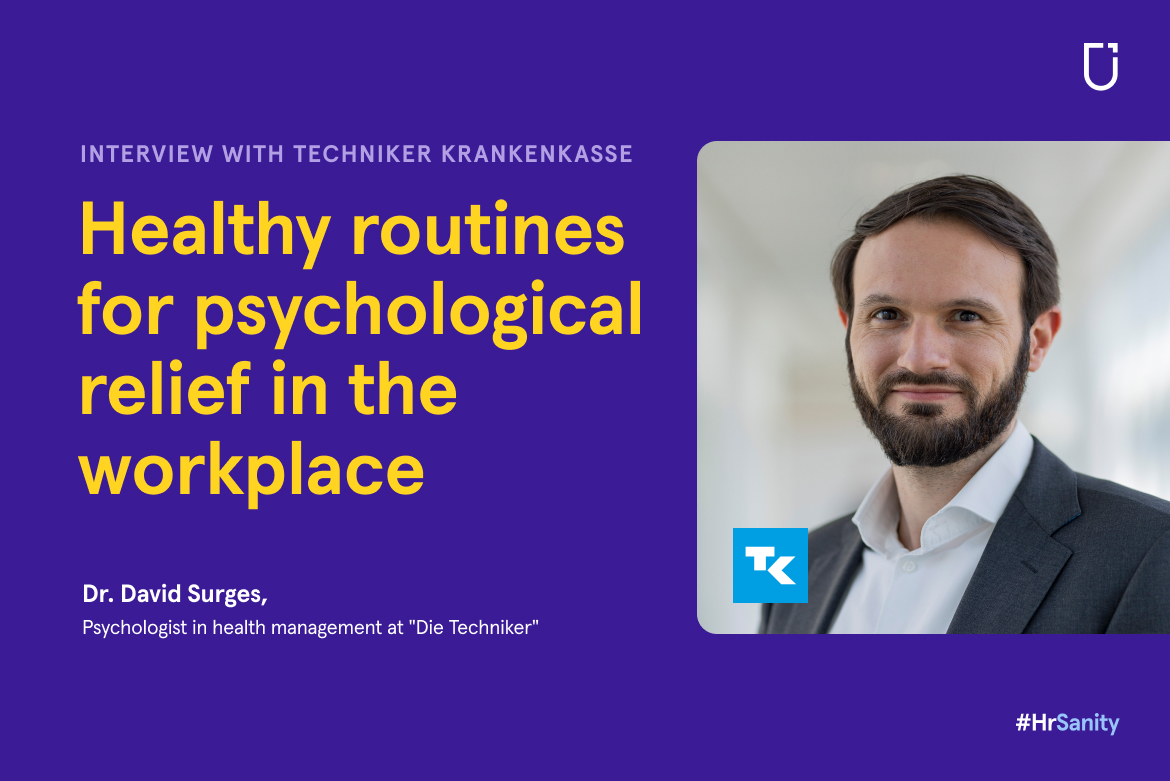Interview partners: Dr. David Surges, psychologist in health management at “Die Techniker” and Daniela Maiorovici, senior PR manager at Urban Sports Club.
Everybody’s talking about resilience and mental health, but the number of people suffering with mental illness in Germany continues to rise. Why is that?
We’ve been seeing a consistent increase in mental illness in recent years. Absenteeism due to mental illness continues to rise year-on-year as well as stress levels for the general population.
The specific causes can vary greatly from person to person but we’ve identified two trends. First, we live in an increasingly complex, fast-changing world. We’re constantly adapting to new stimuli, situations and demands, and habits and routines that used to give us security and strength have fallen apart. People often experience this as a psychological burden and the Corona pandemic has only exacerbated this.
Second, social awareness and acceptance of mental stress and illness has increased. The topic is covered more frequently in the media and celebrities are sharing their own experiences with burnout or depression. Mindfulness, yoga and meditation are trending amongst the population which makes it easier for us to identify our own psychological stress and make use of the support on offer, such as therapy. I see this trend as positive, because psychologists can only do something to counteract stress or illness when the person is willing to address it.
Are companies dealing with the issue sufficiently?
The Corona pandemic has brought the topic of mental health into focus for many companies. Home office and increased workloads during quarantine or lockdown added significant stress to employees, so more and more companies now offer their teams stress management solutions such as mindfulness training, self-management courses and online sports offers to counteract gym closures.
This is extremely important. Social interaction within the office was eliminated, employees were forced to manage their work from home and the boundaries between private and work life were blurred. The aforementioned stress management solutions don’t just strengthen mental resilience but create balance and help employees switch off and relax.
However, we also know that stress at work is caused by many things outside employees’ control, such as too much work, deadline pressure, information overload and poor workplace conditions. This makes it all the more important for employers and managers to ensure working conditions are conducive to health, and to implement structural changes to protect and support the mental health of the team.
What can executives and HR managers do to reduce stress and establish healthy routines?
Managers play a central role in promoting health within a company. It’s crucial that team leads take their own health seriously so they can act as role models for their employees.
Supervisors are exposed to a variety of stresses. More than half of managers report they always work overtime – twice as much as employees without management responsibility – so a clear additional burden. That’s why it’s important managers know their limits, and scheduled time-slots can help them manage their resources and maintain focus.
Management are responsible for making balanced decisions, supporting a team and meeting the expectations of their superiors. This is a big demand. The solution is to relinquish control and trust the abilities of your team. This may be unsettling at first, but it’s beneficial for everyone in the long term.
Here’s a tip: The best way to reduce stress? Try sports. ☺
For me, sports balances everything out. I used to go to the gym, but now I work out at home with bodyweight exercises.

